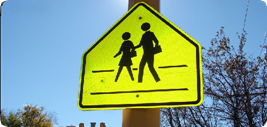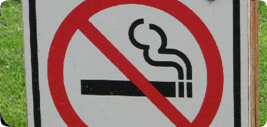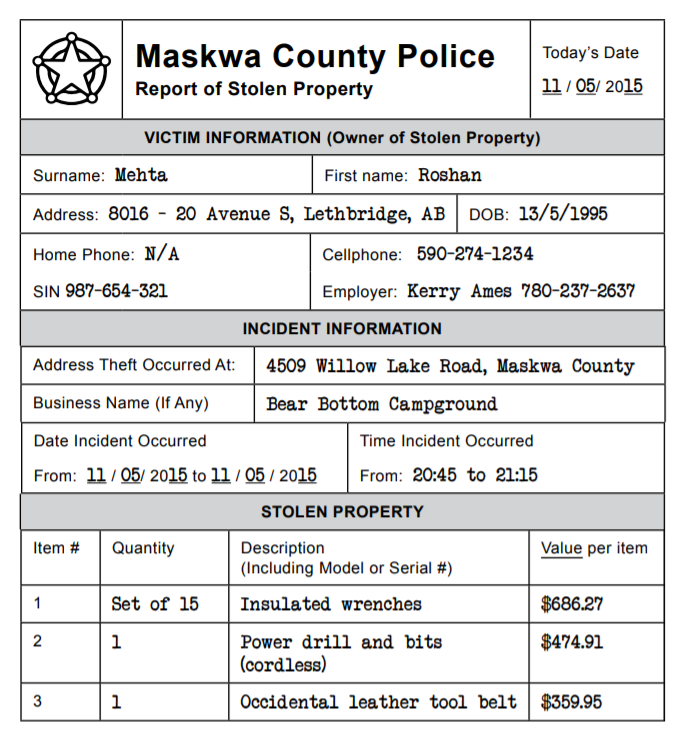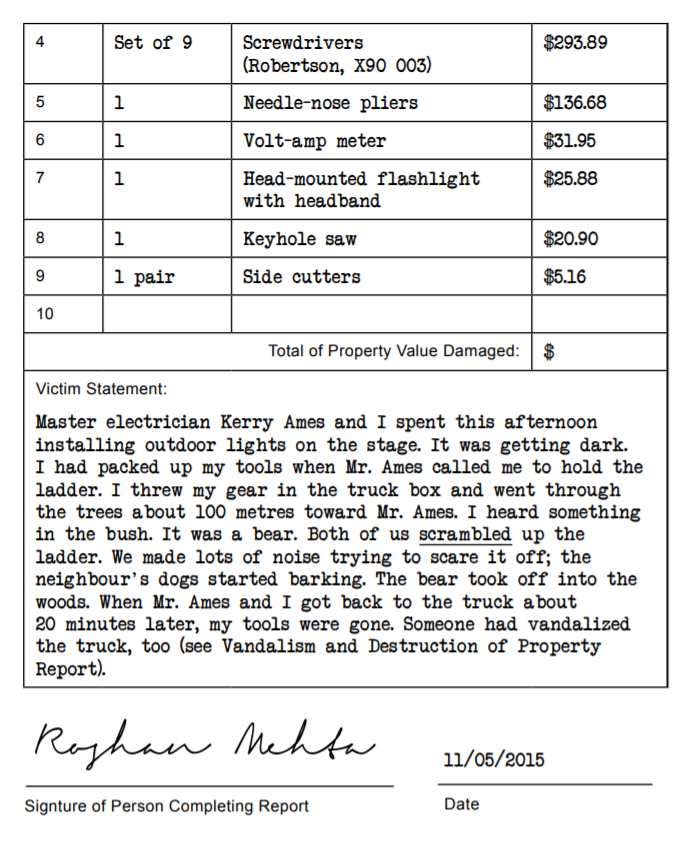15 Reading
Before You Read
Complete these pre-reading activities before you begin to read lists and completed forms. Understanding the arrangement of words and white space in formal documents is an essential skill. It helps readers locate information faster.
MAY Does Not Always Mean What You Think 
Rules are formal sets of instructions. When we have the power to make rules, other people will interact with us for permission.
- The modal verb MAY is helpful in asking for or giving permission.
- However, MAY isn’t always about allowing or prohibiting action. Sometimes MAY shows possibility or hope.
![]() Compare the pairs of sentences below. Do both sentences mean the same thing? Choose = if the sentences have a similar meaning or ≠ if the sentences do not mean the same thing.
Compare the pairs of sentences below. Do both sentences mean the same thing? Choose = if the sentences have a similar meaning or ≠ if the sentences do not mean the same thing.
| 1. | Campers may see bears in the campground. | = ≠ | The campground permits campers to see bears. |
| 2. | May I cook over an open fire? | = ≠ | Am I allowed to burn wood to make meals? |
| 3. | Clean bottles or cans may be put in the recycling bins or taken home. | = ≠ | Campers have two choices for what to do with empty drink containers. |
| 4. | May campers bring a pet into the campground? | = ≠ | Can campers bring a dog or cat into the campground? |
| 5. | May you travel home safely! | = ≠ | You have permission to drive carefully on your way home. |
Vocabulary: Synonyms 
![]() Choose ALL the words or phrases on the right that are synonyms for the word on the left. For a reminder about synonyms, refer to page 66 in Chapter 2.
Choose ALL the words or phrases on the right that are synonyms for the word on the left. For a reminder about synonyms, refer to page 66 in Chapter 2.
| bare | basic | a couple of | a lock | to uncover |
|---|---|---|---|---|
| bear | to carry | to give birth | a large, furry, wild animal | to hold |
| charge | to attack | to ask as a fee | a place to pray | a price |
Predictions
You are going to read a sign from Bear Bottom Campground. On the sign are “do’s” and “don’ts” for campers. Some people think rules are mostly “don’ts” or prohibitions.
Claire calls her rules “camping courtesies.” Since courtesy means courteous or good manners, do you predict that there will be more negative “don’ts” or more positive “do’s” on Claire’s sign?
- What kind of obligations, or responsibilities, do campers have to each other? Suggest one rule for good camping behaviour during the daytime and another courtesy for after sundown.
- What will Claire do to ensure the safety of campers?
- Will Claire use the same words to write prohibitions, courtesies, and safety rules?
- If not, how will Claire adjust how she writes about dangerous behaviour compared to helpful behaviour or in contrast to banned behaviour?
Reading 1
![]() Read a sign posted at Bear Bottom Campground
Read a sign posted at Bear Bottom Campground
Camping Courtesies
The Bare Necessities
CHECK IN
Campers:
• Register at the Campground Office upon arrival to pick up your permit.
• Display your vehicle pass at all times.
• Check out by noon. In exceptional circumstances, you may avoid the extra late charge by telling the manager in advance.
Visitors:
• Check in at the office before dropping in on campers.
• You must park in designated areas only.
• Leave before the security gate is closed at 9:00 p.m.FIRES• No open fires are allowed during a fire ban.
• Check the Daily Notice Board at the office.
• Follow signage to the woodpile behind the office to buy firewood.
• Firewood must be burned in fire rings only.
• Put out your fire before you leave.NOISE
• Quiet hours are 11:00 p.m. to 8:00 a.m.
• No loud music at campsites at any time.PETS
• Dogs and cats must be on a leash at all times.
• Pick up all droppings; place in bear-proof bins.
• Clean up after your animals.
TRASH & RECYCLING
• Recycle clean bottles, pop cans, and plastic water bottles in the labelled bin
near the office.
• Place all garbage in bear-proof bins.
Campground management enforces these rules.
The Bear Facts
Black bears live in this valley. Campsites must be kept clean and tidy at all times.
• Do not feed the bears.
• Store food in airtight containers in your vehicle or car trunk.
• Any food or coolers left unattended will be confiscated.
• Cook and eat well away from your tent.
• Clean up immediately and thoroughly after cooking.
• A clean-up fee will be charged if your campsite requires additional cleaning after you check out.
You may see or meet a bear.
• Watch for bear signs such as tracks, droppings, overturned rocks, damaged trees, fresh digging, or crushed grass.
Never approach a bear.
• If you see a bear in the distance, do not try to pass it. Leave the area.
• If a bear is close by, remain calm and keep the bear in sight. Avoid direct eye contact. Move away without running.
If a bear approaches you and is standing up, it may be trying to identify you.
• Talk softly so it knows what you are.
• If it is snapping its jaws, baring its teeth, lowering its head, flattening its ears, or making “woofing” noises, it may be about to charge.
• Do not run unless you are very close to a secure place. Move away slowly, keeping the bear in view. Avoid direct eye contact.
Report all bear signs or sightings to the Campground Office.
After You Read
Comprehension 
Strategy 1: Scanning Document Layout
![]() Choose the best answer:
Choose the best answer:
1. Claire arranged the basic, important rules
a) first
b) last
c) in numerical order
2. She arranged the headings of the basic rules in order of
a) the time to do these things
b) the alphabet
c) the safety of everyone
3. The Bear Facts are
a) information to teach campers about bears
b) rules to help campers be safe from bears
c) suggestions to help campers protect bears
4. Claire uses bullets to
a) protect campers from bears
b) organize campground rules
c) describe the campground
Strategy 2: Inferring Meaning
When writers are indirect, readers understand the true meaning by inferring, or guessing, using the context.
![]() Choose all the possible answers by inferring.
Choose all the possible answers by inferring.
1. “In exceptional circumstances, you may avoid the extra late charge by telling the manager in advance” means that
a) there is a way to stay after noon and not pay an extra fee
b) paying an extra fee for leaving late is unusual
c) except for the manager, everyone pays extra charges
d) the manager always cancels late charges for people who talk to her
2. “Visitors must park in designated areas only” means that
a) visitors cannot drive to the park
b) there are visitor parking signs
c) Bear Bottom Campground permits visitors
d) you can park wherever you like
3. “No open fires are allowed during a fire ban” means that
a) barbecues are never allowed
b) it doesn’t rain very much at Bear Bottom Campground
c) the manager can prohibit fires
d) you’re not permitted to have a fire
Strategy 3: Paraphrasing
![]() Choose the best answer.
Choose the best answer.
1. Another way to say “Any food or coolers left unattended will be confiscated” is
a) “Always watch your food because Claire may take it away.”
b) “Claire removes any food you leave outside when you’re not around.”
2. Another way to say “A clean-up fee will be charged if your campsite requires additional cleaning after you check out” is
a) “Campers who leave a mess behind will get a bill for Claire’s extra work.”
b) “Check that another fee isn’t added to your charges when you leave the campground.”
3. Another way to say “If a bear is close by, remain calm and keep the bear in sight” is
a) “If you are near a bear, watch out.”
b) “Keep your eyes on any bear you meet and stay cool.”
Vocabulary 
Strategy: Reinforcement of Words and Definitions through Use in Context
![]() Fill in the blanks using the correct word or phrase from the list.
Fill in the blanks using the correct word or phrase from the list.
| bear | baring | charge | charges |
| check | check out | drop in | droppings |
1. Watch where you step. __________ may be signs of bears or pets.
2. If a bear is ___________ its teeth, it may be ready to attack.
3. Before leaving a campsite, a courteous camper will ____________ that all garbage is picked up.
4. Visitors should ______________ in mind that the security gates closes at 9:00 p.m.
5. Normal campground ______________ don’t include the price of firewood.
Reading 2
![]() Read the form Roshan completed about the theft of his tools.
Read the form Roshan completed about the theft of his tools.
Reading Progress Check
Comprehension 
Strategy 1: Scanning a Document
1. Choose the best answer. The part of the form that may include some opinion is
a) Victim Information
b) Incident Information
c) Stolen Property
d) Victim Statement
2. Choose the best answer. What fact did Roshan write four times?
a) His own name
b) The name of his boss
c) His date of birth
d) The date of the theft
3. Choose the best answer. How did Roshan organize his list of stolen property?
a) By number, from 1 to 10
b) By quantity
c) By alphabet
d) By value
4. Choose all the correct answers. What must Roshan still complete?
a) His home phone number
b) Property item number 10
c) The descriptions of the stolen tools
d) The total value of his stolen items
Strategy 2: Locating Facts with Numbers
1. Choose the best answer. In his personal information, what extra fact did Roshan give that was not requested?
a) His parents’ address
b) His boss’s phone number
c) His date of birth
d) His personal social insurance number
2. Choose the best answer. Roshan reported the theft to the police
a) the day it happened
b) on November 5
c) between 8:45 p.m. and 9:15 p.m.
d) before sundown
Vocabulary 
Strategy: Using Context to Determine Meaning
1. The word BAND has several meanings. In each sentence below, indicate the word or words that could be replaced by BAND.
a) Each musical group that wants to play at the festival must apply.
b) Electricians don’t wear a wedding ring when working with electricity.
c) Roshan lost a light fastened to a strip of cloth around his head.
d) Wildlife officers stopped a crowd of angry campers from chasing a bear.
2. The phrase TOOK OFF has several meanings. In each sentence below indicate the word that could be replaced by TOOK OFF.
a) The bear escaped into the forest.
b) Roshan removed his tool belt and put it in the truck.
c) The insurance company deducted part of the value of Roshan’s tools.
d) No one saw the robbery. The thief left quickly and quietly.
Discussion
NOTICE the kind of rules Claire included on the Camping Courtesies sign.
Which rules are for safety and which are for courtesy or good behaviour?
FIND a prohibition, a “do,” a courtesy, and a safety-related obligation or rule.
COMPARE your predictions from page 122 with the rules Claire includes on her sign. Did any of your predictions appear on Claire’s sign?
DISCUSS how you feel about Claire’s rules.
Are there any rules that make you feel confused or uncomfortable?
Which rules seem familiar to you?
Share reasons for how you feel and what you think about Claire’s rules.
IDENTIFY Claire’s perspective.
Why might these rules and courtesies be important to her?
DISCUSS if you have the same understanding of “safety” and “courtesy” as Claire or your classmates. If not, how is your understanding different?
How will these different perspectives change how you understand and talk about rules?
THINK about your relationships outside English class.
TALK about situations in which you have rules to follow.
Are these rules always written where everyone can see them?
Are some rules only spoken but not written?
Are there any unwritten rules that no one speaks about directly?
Perhaps you guess there is a social obligation or prohibition, but it isn’t clear.
How do you feel when someone breaks an invisible or unwritten rule? How do you talk to someone who breaks an unwritten rule?
TALK about situations in which you have, or have had, the power to make rules.
Why did you allow or disallow some behaviour?
Was safety a reason?
What does it feel like to enforce a rule on other people?
Do you always enforce a rule, or are there times when you ignore a rule-breaker?
How do you decide whether you will enforce a rule or not?
Extension Activities 
1. Language Logs
Print another set of Language Observer Log and Language User Log pages to help you to try out words and expressions from this chapter in your daily life.
2. Focus on Unwritten Rules
Our communities have many rules that are communicated by symbols instead of lists of words and sentences like the ones Claire made for the campground. Here are three examples you might recognize:
For each photo below, the rule we know but isn’t stated in words could be

Don’t pass.
OR
Stay on your side of the road.

The rule could be
Watch out for students.
OR
Slow down. Children are crossing the road.

The rule could be
No smoking allowed.
OR
Don’t light up.
For this activity, extend or stretch your learning outside English class.
- Go out in your community.
- Use your cellphone or camera to take pictures of symbols that are really messages about rules.
- Print your pictures or save them in a format that you can easily show to other people.
- Identify a rule that each symbol communicates.
- Write the rule in a couple of different ways.
Reading Progress Check 
On the next page, you are going to read four rules for campers about fires.
Read the questions and answers before reading the rules. This is a strategy to help you locate the answers more easily.
After you read the set of rules on the next page, answer the questions.
![]() Choose the best answer.
Choose the best answer.
1. If you are a camper, you ________ these regulations.
a) may follow
b) must follow
c) don’t have to follow
d) follow
2. Campers with permits are given permission to
a) take wood away from the campground
b) smoke around a campfire
c) bring wood from home
d) build a campfire
3. The campground rules prohibit
a) fire regulations
b) burning wet wood
c) quiet hours
d) leaving while a fire is burning
4. Campers are obliged to
a) pay for building a fire
b) make sure to obey parking signs
c) burn garbage
d) ban alcohol
5. These regulations are
a) many “do’s” and a few “don’ts”
b) mostly negative rules
c) more “don’ts” than “do’s”
d) only a few of many rules
![]() Read the rules for campers about fires.
Read the rules for campers about fires.
In order to keep your campfire safe for you and for the environment, follow these regulations:
Fire Permit:
• Campers may have a campfire after they purchase a fire permit for $8.80 per site per night (includes firewood).
• Permits are available at the Campground Office.
Fire Size:
• To reduce the negative effects of campfire smoke on all campers, please use dry wood and keep your fires to a reasonable size.
• Fires must be contained. It is illegal to have a fire outside the firebox or fire ring provided in each site.
Wood:
• Use wood that is provided within the woodlot.
• Do not burn garbage.
• You must not collect fallen trees from the surrounding forest for burning.
Times:
• Campfires are prohibited during quiet hours (11:00 p.m. to 8:00 a.m.).
• Fires must be attended at all times.
• Please review the Alcohol and Fire Bans section for more information.



